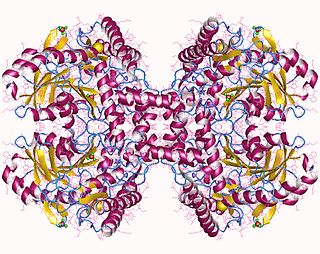In molecular biology, biosynthesis is a multi-step, enzyme-catalyzed process where substrates are converted into more complex products in living organisms. In biosynthesis, simple compounds are modified, converted into other compounds, or joined to form macromolecules. This process often consists of metabolic pathways. Some of these biosynthetic pathways are located within a single cellular organelle, while others involve enzymes that are located within multiple cellular organelles. Examples of these biosynthetic pathways include the production of lipid membrane components and nucleotides. Biosynthesis is usually synonymous with anabolism.

Methionine synthase also known as MS, MeSe, MTR is responsible for the regeneration of methionine from homocysteine. In humans it is encoded by the MTR gene (5-methyltetrahydrofolate-homocysteine methyltransferase). Methionine synthase forms part of the S-adenosylmethionine (SAMe) biosynthesis and regeneration cycle, and is the enzyme responsible for linking the cycle to one-carbon metabolism via the folate cycle. There are two primary forms of this enzyme, the Vitamin B12 (cobalamin)-dependent (MetH) and independent (MetE) forms, although minimal core methionine synthases that do not fit cleanly into either category have also been described in some anaerobic bacteria. The two dominant forms of the enzymes appear to be evolutionary independent and rely on considerably different chemical mechanisms. Mammals and other higher eukaryotes express only the cobalamin-dependent form. In contrast, the distribution of the two forms in Archaeplastida (plants and algae) is more complex. Plants exclusively possess the cobalamin-independent form, while algae have either one of the two, depending on species. Many different microorganisms express both the cobalamin-dependent and cobalamin-independent forms.

Pseudouridine is an isomer of the nucleoside uridine in which the uracil is attached via a carbon-carbon instead of a nitrogen-carbon glycosidic bond.

Amino acid synthesis is the set of biochemical processes by which the amino acids are produced. The substrates for these processes are various compounds in the organism's diet or growth media. Not all organisms are able to synthesize all amino acids. For example, humans can synthesize 11 of the 20 standard amino acids. These 11 are called the non-essential amino acids).
In enzymology, a tRNA-pseudouridine synthase I is an enzyme that catalyzes the chemical reaction
21S rRNA (uridine2791-2'-O)-methyltransferase is an enzyme with systematic name S-adenosyl-L-methionine:21S rRNA (uridine2791-2'-O-)-methyltransferase. This enzyme catalyses the following chemical reaction

O-phospho-L-seryl-tRNASec:L-selenocysteinyl-tRNA synthase is an enzyme with systematic name selenophosphate:O-phospho-L-seryl-tRNASec selenium transferase. This enzyme catalyses the following chemical reaction
16S rRNA pseudouridine516 synthase (EC 5.4.99.19, 16S RNA pseudouridine516 synthase, 16S PsiI516 synthase, 16S RNA Psi516 synthase, RNA pseudouridine synthase RsuA, RsuA, 16S RNA pseudouridine 516 synthase) is an enzyme with systematic name 16S rRNA-uridine516 uracil mutase. This enzyme catalyses the following chemical reaction
23S rRNA pseudouridine2457 synthase is an enzyme with systematic name 23S rRNA-uridine2457 uracil mutase. This enzyme catalyses the following chemical reaction
23S rRNA pseudouridine2605 synthase is an enzyme with systematic name 23S rRNA-uridine2605 uracil mutase. This enzyme catalyses the following chemical reaction
23S rRNA pseudouridine1911/1915/1917 synthase (EC 5.4.99.23, RluD, pseudouridine synthase RluD) is an enzyme with systematic name 23S rRNA-uridine1911/1915/1917 uracil mutase. This enzyme catalyses the following chemical reaction
23S rRNA pseudouridine955/2504/2580 synthase is an enzyme with systematic name 23S rRNA-uridine955/2504/2580 uracil mutase. This enzyme catalyses the following chemical reaction
tRNA pseudouridine55 synthase is an enzyme with systematic name tRNA-uridine55 uracil mutase. This enzyme catalyses the following chemical reaction
tRNA pseudouridine13 synthase is an enzyme with systematic name tRNA-uridine13 uracil mutase. This enzyme catalyses the following chemical reaction
tRNA pseudouridine32 synthase is an enzyme with systematic name tRNA-uridine32 uracil mutase. This enzyme catalyses the following chemical reaction
23S rRNA pseudouridine746 synthase (EC 5.4.99.29, RluA, 23S RNA PSI746 synthase, 23S rRNA pseudouridine synthase, pseudouridine synthase RluA) is an enzyme with systematic name 23S rRNA-uridine746 uracil mutase. This enzyme catalyses the following chemical reaction
Mitochondrial tRNA pseudouridine27/28 synthase is an enzyme with systematic name mitochondrial tRNA-uridine27/28 uracil mutase. This enzyme catalyses the following chemical reaction




